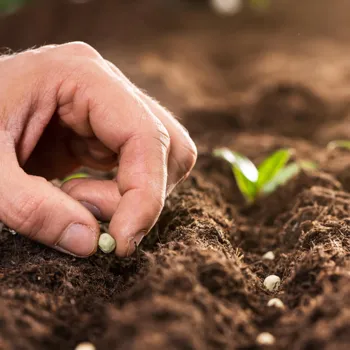Go Green, Grow Green! 8 Must-Follow Tips for a Sustainable Garden, Bhai!"
Want a greener garden? Learn how sustainable gardening can benefit you and the planet. Read on for essential tips!
Namaste, folks!
Are you feeling the heat, both from the sun and, well, the planet? We all know climate change is real, and while big changes are needed at the top, every little bit helps, right? And what better way to do your bit than from your own little backyard, terrace, or even balcony?
Sustainable gardening is not just a trend; it's a necessity, a way to reconnect with nature, and grow some tasty veggies and lovely flowers while you are at it.
So, ditch the chemicals, embrace the eco-friendly way, and let's get our hands dirty with these eight super simple yet super effective practices for a garden that's good for you, good for the planet, and good for your neighbours too!
From embracing the age-old wisdom of composting to choosing native plants that thrive naturally in our climate, each practice offers a unique avenue for cultivating a greener, more bountiful garden while minimizing our environmental impact.
The beauty of sustainable gardening lies in its accessibility, adaptable to various spaces and skill levels. Whether you possess a sprawling backyard or a petite balcony, there exist sustainable gardening techniques tailored to suit your requirements.
So, put on your gardening gloves, grab your tools, and let's delve into eight essential practices that will transform your garden into a sustainable oasis. By adopting these measures, you'll actively contribute to safeguarding our planet for generations to come.
Soil is King (or Queen!): Embrace Organic Goodness.
Forget those artificial fertilizers packed with chemicals that promise instant results. They might give you a quick boost, but in the long run, they harm the soil, pollute the water, and are not sustainable at all! Instead, treat your soil like gold. It's the foundation of everything you grow.
The best way to treat your soil with love is by using organic compost, which will help in nurturing the soil, by getting the required nutrients for all the plants added in the garden.
Another good option is to add well-rotted manure, which will also help in providing a good amount of nutrients to your plants, especially the ones that need a very good amount of nutrients, can benefit a lot from manure.
You can also go for the vermicompost options as well, which is another great way of nurturing your soil. Another thing you can do, is mulching, this one is a game changer. Mulching involves covering the soil surface with organic materials like dry leaves, straw, or wood chips.
This helps retain moisture, suppress weeds, regulate soil temperature, and break down over time, adding nutrients back to the soil, thus making the soil much more rich.
Waste Not, Want Not: Become a Composting Champion!
Speaking of compost, every kitchen can become a composting center! Don't throw away your vegetable peels, fruit scraps, tea bags, or coffee grounds. These are all treasures for your compost bin.
Composting is like magic: you turn waste into nutrient-rich compost that's perfect for feeding your plants. It's a win-win situation! You reduce landfill waste, and you create amazing fertilizer for your garden. There are countless ways to start your own compost adventure.
From simple backyard piles to fancy compost tumblers or even indoor worm farms are easily available in the stores. You can choose the system that works for you. Just remember to layer "greens" (like vegetable scraps) with "browns" (like dry leaves and twigs) and keep it moist.
Within a few months, you will have "black gold" ready to nourish your garden. Make sure you maintain your compost well or else it would attract insects and it gives a foul smell that spreads all over the place. Keep it moist and covered!
Native is Nifty: Choose Local Plants, Yaar!
Think local when selecting plants for your garden. Native plants are plants that naturally grow in your region. They are perfectly adapted to the local climate, soil, and rainfall patterns. This means they require less water, less fertilizer, and less pest control compared to exotic plants.
Plus, they attract local birds, butterflies, and other beneficial insects, creating a thriving ecosystem in your garden. Do your research and find out which plants are native to your area. Your local nursery or gardening club can be a great resource.
By choosing native plants, you're supporting biodiversity and creating a low-maintenance, sustainable garden that blends seamlessly with the natural landscape. Always consult your local expert before taking any major steps. One must know the plant well enough before taking it home and planting it.
It is better to choose native options of plants in this case.
Water Wise: Conserve Every Drop, Boss!
Water is precious, especially in many parts of India. So, be smart about how you use it in your garden! The best way to start saving water is by watering efficiently. Water deeply but less frequently. This encourages roots to grow deeper, making plants more drought-tolerant.
Avoid overhead watering, which can lead to evaporation and fungal diseases. Instead, use drip irrigation or soaker hoses to deliver water directly to the roots. Another great tip is to collect rainwater. Set up rain barrels or containers to capture rainwater from your roof.
This is a free and sustainable source of water for your garden. And finally, choose drought-tolerant plants. Many beautiful and hardy plants thrive in dry conditions. Research and select plants that require minimal watering.
Pest Control, Desi Style: Invite the Good Guys!
Say no to harmful pesticides! They kill beneficial insects along with the pests, disrupting the natural balance of your garden. Instead, embrace organic pest control methods. One effective technique is companion planting. Certain plants repel pests or attract beneficial insects that prey on pests.
For example, marigolds repel nematodes, and ladybugs eat aphids. Attracting birds to your garden is another great way to control pests. Birds love to eat insects. Provide them with food, water, and shelter, and they'll happily patrol your garden for pests.
You can also use natural pest control sprays made from neem oil, garlic, or chilli to deter pests. Always read the instructions carefully before applying any spray, and test it on a small area of the plant first.
Seeds of Change: Grow Your Own, Be Self-Sufficient!
Growing your own food is one of the most rewarding experiences in gardening. And what better way to do it than by saving seeds from your best plants? Seed saving is a traditional practice that helps preserve genetic diversity and ensures that you always have seeds of your favourite varieties.

When your vegetables or flowers are ready, let a few go to seed. Collect the seeds, dry, and store them in a cool, dark place. Label them clearly with the plant name and date. Next season, you can plant these seeds and grow your own plants.
It's amazing to witness the entire life cycle of a plant, from seed to harvest and back to seed again.
Another fantastic way to expand your plant collection is through propagation. Many plants can be easily propagated from cuttings, division, or layering.
This is a great way to get new plants for free and share them with friends and neighbours. Not everything has to be complicated, just keep it simple!
Weeds Be Gone (Naturally!): Embrace the Hand Weeder
Tired of those pesky weeds taking over your garden? Ditch the herbicides and embrace the old-fashioned hand weeder! Nothing beats good old-fashioned elbow grease when it comes to weed control. Get down on your hands and knees and pull out those weeds by the roots.
This is the most effective way to get rid of them and prevent them from coming back. You can also use mulching to suppress weeds. A thick layer of mulch will block sunlight and prevent weeds from germinating. Another tip is to weed regularly. Don't let weeds get out of control.
The more often you weed, the easier it will be to keep your garden weed-free.
Share the Love: Connect with the Community, Grow Together!
Gardening is even more enjoyable when you share your experiences with others. Connect with your local gardening community, join a gardening club, or start a community garden. Share your seeds, plants, and knowledge with your neighbours. Exchange tips and tricks with other gardeners.
Gardening is a great way to build community and create a more sustainable and resilient neighbourhood. By working together, we can make a real difference in our environment and create a more beautiful and healthy world for everyone. Together we can grow, flourish, and thrive with each other.
So there you are, folks! Eight simple yet powerful practices to transform your garden into a sustainable haven. Remember, every small step counts. By embracing these tips, you are not just growing plants but also contributing to a healthier planet. Happy gardening, and Jai Hind!
















